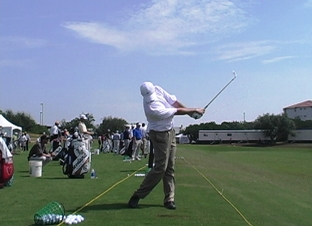 “Practice hard and practice often son,”…“You won’t get anywhere without hard work,” or, “remember, practice makes perfect.” Or how about this one; “you’ll never make it because you don’t practice hard enough.” I heard statements like these throughout my teenage years and like the good disciple that I was, I followed the advice and went to the practice fairway nearly every day for years, and practiced and practiced, and guess what? I never played the game of golf as good as I wanted to, but I did hit the golf ball a lot better. Does this sound familiar? Every day, the golf driving ranges and practice fairways at golf clubs everywhere have ambitious golfers toiling away at golf shot after golf shot striving to get better at golf. Possibly they have heard similar statements to those above that they should practice hard and often. What’s interesting is that for many golfers these statements imply that you should practice your golf swing harder than any other skill set. I did, and many others do as well. There’s no doubt that practicing your golf swing often will make you more proficient at it. But does it make you better? Well, I guess that depends on what you think better is. If it means that you wish to possess a lower score average than you have right now then practicing your golf swing technique a lot more than any other skill will probably be the limiting factor in your game. Also, can you keep getting better? This might be the most important question of all. I’ve seen it too often, and the problem is that it doesn’t seem to be changing any time soon. The golf instruction industry has a pre-occupation for golf swing technique, and many golfers are getting so tied up in knots trying to improve their golf swing at the expense of learning how to play golf better. Give the customer what they want right? They want a golf swing like Tiger Woods so give them one. It’s fair to say that Tiger is the product of thousands of hours of highly disciplined golf training. Notice I said training? Highly competent golfers have transcended practicing at golf swing to training at golf score. 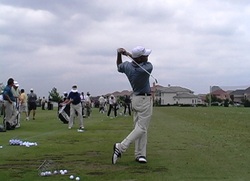 Golf Practice Designed to Optimise Your Improvement My definition of practicing is that it’s the act of rehearsing behaviour until you improve it, or master it. Training on the other hand refers to the acquiring of knowledge, skills and capabilities that relate to achieving defined outcomes within a certain time frame. For me golf practice is old vernacular, it’s the twentieth century’s approach to golf improvement. Training is twenty first century improvement technology. "It’s not enough to go to a range and mindlessly repeat a golf swing action over and over and somehow expect that you will get continually better. You won’t!" If the old way was to go to the range for a few hours and hit some long shots, then chip and pitch a few, followed by some putting, then the new way is golf training designed to optimise improvement. In other words you don’t do it without a well thought out and constructed plan that takes into account your personal goals and the amount of time you can devote to your activity.  There are four principles in the deliberate golf training framework that we need to look at that will help us to work at our craft more competently and successfully. Performing a component of your skill in an excellent way Isolating a component of your skill that needs attention and judiciously practicing that part of the skill until you have improved its value in the whole. A bent left wrist at the top of the back swing may result in a club face that is open to the plane you’re swinging on, which can lead to excessive slice in your shots. By flattening the left wrist position and squaring the club face in the process, this will reduce the excessive side spin on your golf shot. Monitoring your ongoing performance Vigilantly monitoring your progress through data collection that you completely understand will keep you close to the cutting edge of your skills development. You simply can’t improve something if you can’t measure its current position in relation to where you want it to be. For your score average to lower, you need to collect data on a number of key skill areas to determine which of them has the most impact on improving your results. 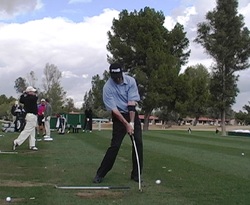 Evaluating your success through a feedback system Meaningful feedback is the breakfast of champions. Every successful individual, sporting team or workplace team has a useful feedback system in place to guide the direction of the momentum that’s being created from the effort they put it. The type of feedback I’m talking about isn’t a motivating speech which might psych you up in the short term but won’t change the way you do something in the long term. The type of feedback I’m talking about is that of an expert teacher or instructor, someone who can, and has done it at a very high level in their own right, and can show you exactly what to do. Determining how to do it better The whole purpose of deliberate golf training is to continually get better at the game of golf. By now you will understand that practicing on a consistent basis won’t necessarily improve what you do. You really need to think about it carefully and thoughtfully before you apply yourself physically to the demands of the game. Many of the golfers I’ve worked with over the years have a strong desire to get better at the game, but they don’t really know how to. Information is useless until you understand how it can help you. When you go out to work on your game next time, take the time to think about what you would like to gain from the experience. If you want to keep improving your golf, you need to find out exactly how to do that. It isn’t enough to just put effort into your game, you need to understand where you wish to go; what you need to practice; and you have to have the desire to keep at it continually until you can see and feel the difference. Lawrie Montague 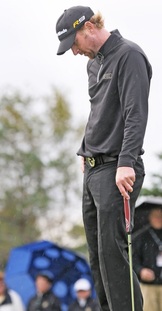 PGA golf qualifying school could just possibly be the most difficult job application process in the world. Can you imagine applying for a potentially very high paying job as a golf tournament pro that required you to go through a minimum of three gruelling 72 hole qualifying tournaments starting with over one thousand other golfers from fifteen different countries before you make it to the final qualifying stage where you have to compete over another 108 holes with about 120 other golfers for just twenty five available spots on the US PGA tour? Every year ambitious and highly skilled male and female amateur and professional golfers aged somewhere between eighteen and fifty five test their courage and skills competing to gain a place on one of the lucrative professional golf tours around the world by going through a process just like this. 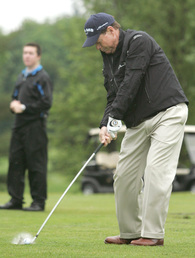 In this article I’ll attempt to give you an idea of just what it would take for you to compete head to head with the stars of the PGA tours or for that matter, the LPGA tour or Champions tour. LPGA and PGA golf tournament pro’s are the product of literally thousands of hours of dedicated practice and competition; but when all is said and done what really matters to them is qualifying to play on one of the pro golfing tours and staying there. This as you will discover is a lot easier said than done. So here’s what you have to do to apply for a golf on tour job. GOLF ON TOUR JOB DESCRIPTION – PGA TOUR PLAYER
GOLF ON TOUR PERFORMANCE CRITERIA – PGA TOUR PLAYER
THE PROCESS TO GAIN ADMISSION TO A GOLF ON TOUR POSITION – PGA TOUR PLAYER To qualify for a Golf On Tour job you will be required to carry out the following four steps:
 Can you imagine playing 324 holes of golf at the highest standard possible to compete for just one of twenty five places on the PGA tour? Oh, and did I mention that you have to pay a minimum twelve thousand dollars just to get a shot at it? That’s right, not only will you have to compete with the best players in the game, to gain a place on the PGA tour, you will have to invest a significant amount of money as well. This could possibly be the ultimate litmus test for a prospective golf tournament pro. Any man or women contemplating a life as a golf tournament pro is betting on their skills and capability by paying for the privilege up front to play and compete on one of the pro golfing tours. And if you are fortunate enough to make it onto the PGA tour you will need to earn at least one million dollars over approximately 100 competitive rounds, or about forty thousand dollars per week over twenty five weeks to retain your playing privileges for the next year. What could be easier than that? Lawrie Montague Englishman Luke Donald won the Accenture Match-play Championship playing just 89 holes during his six matches for the week. He was never behind at any time and never had to play the 18th hole, and in-fact only had to play the 17th hole once. 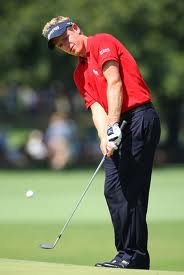 He amassed 32 birdies for the week - an average of more than five per round, which was also seven more than anybody else in the field. He seemed to be a golfer in complete control of his game and was rarely threatened even when the challenge was taken to him he had the answer. Luke Donald is not a long hitter of the golf ball (Averages 277 yards or around 250 meters from the tee) and in-fact actually went through the process of trying to increase his distance off the tee to be more competitive with the longer hitters which turned out to be a bad decision for him. Fortunately though, he went back to what he knows and trusts and this victory in the Accenture Matchplay Championship has propelled him from 9th place in the Sony World Rankings to number three. Luke Donald’s weapon - his competitive advantage is his supreme confidence in his short-game. His consistent chipping, pitching, sand and putting skills gives him a decided advantage competing on the PGA tour because whenever he misses a green in regulation there is a very high probability that he will get the ball onto the green and into the hole for par or better most of the time.  This is very typical for the top ranked players on the PGA tours. Have a look at some of the key performance statistics of Luke Donald from last season (2010) on the PGA tour and you'll see exactly what I mean. Score Average - 70.25 / rank 31st Top 10 Finishes - 7 / rank 6th Putts Per Greens Hit in Regulation - 1.751 / rank 17th Total Putts - 28.46 / rank 8th 3 Putt Avoidance - 1.63 % / rank 5th (3 putts or more divided by total holes played) Sand Saves - 66.39 % / rank 1st Proximity to Hole from Sand (Greenside) Average 7 feet from the hole / rank 2 Greenside Scrambling - 65.41 % / rank 4th Putting Inside 5 Feet - 98.22 % / rank 3rd Putting 5 to 15 Feet - 51.45 % / rank 2nd Putting 3 to 5 Feet - 92.68 % / rank 7th Scrambling From the Greenside Rough - 67.41 % / rank 4th  If you want to see where great golf is really played, study the statistics of Luke Donald and start looking at these key performance statistics in your game. You will quickly realize that improvement in any of these short-game skills will definitely lower your score average faster and make you a lot more competitive on the golf course sooner. Lawrie Montague |
Archives
June 2019
|
Proudly Supported By
Copyright © 2011 - 2018 Pro Tour Golf College
Website Managed By Golf Performance Media
All Rights Reserved
Website Managed By Golf Performance Media
All Rights Reserved


 RSS Feed
RSS Feed



